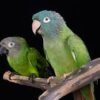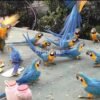Uncategorized
The Dusky Conure: An In-Depth Look at the Dusky-Headed Conure
Conures are a popular choice among bird enthusiasts for their vibrant personalities and playful antics. Among the many species, the Dusky Conure—also known as the Dusky-Headed Conure—stands out for its charm and captivating appearance. In this blog, we will explore various aspects of the Dusky Conure, including its characteristics, care requirements, and why it might be the perfect companion for you.
Table of Contents
- Introduction to Dusky Conures
- Physical Characteristics
- Personality and Behavior
- Diet and Nutrition
- Housing and Environment
- Socialization and Training
- Health Considerations
- Common Misconceptions
- Conclusion
Introduction to Dusky Conures
The Dusky Conure (Aratinga weddellii) is a small to medium-sized parrot that is native to South America. Primarily found in the wild in regions of Brazil and Paraguay, these birds are known for their playful and affectionate nature. The Dusky Conure is often confused with other species due to its similar appearance, but its unique traits make it a distinct and delightful companion.
The Dusky-Headed Conure: A Closer Look
Often referred to interchangeably with the Dusky Conure, the Dusky-Headed Conure is a specific variety that boasts a similar personality and care requirements. The terminology can vary based on region, but both names refer to the same charming bird. Their captivating behavior and stunning colors make them a favorite among bird lovers.
Physical Characteristics
The Dusky Conure exhibits several distinctive physical traits that contribute to its appeal.
Size and Weight
Typically, Dusky Conures measure about 10 to 12 inches in length, making them a manageable size for most bird owners. They generally weigh between 4 to 6 ounces, which is relatively light compared to other parrot species.
Plumage and Coloration
The coloration of the Dusky Conure is one of its standout features. Their feathers are predominantly green with a lovely gradient of shades, providing a vivid and attractive appearance. The head is a darker gray-brown color, which gives the bird its name, while their underparts have hints of yellow and blue, especially visible in flight.
Lifespan
With proper care, Dusky Conures can live between 20 to 30 years, making them a long-term commitment for potential owners. Their lifespan depends on several factors, including diet, environment, and health care.
Personality and Behavior
One of the most appealing aspects of the Dusky Conure is its vibrant personality.
Social and Affectionate Nature
Dusky Conures are known for their affectionate and social demeanor. They thrive on interaction, not only with their human companions but also with other birds. This social nature makes them a great choice for families and individuals who can dedicate time to bonding with their pets.
Playful and Intelligent
These birds are incredibly playful and curious, often engaging in acrobatics and exploring their surroundings. Their intelligence allows them to learn tricks and commands easily, making training a fun experience. Engaging toys, puzzles, and interactive playtime are essential for keeping a Dusky Conure mentally stimulated.
Vocalization
While not as loud as some other parrot species, Dusky Conures are still vocal birds. They can produce a range of sounds, including whistles, squawks, and chirps. Their vocalizations are often lively and entertaining, adding to the joy of having them as companions.
Diet and Nutrition
Feeding your Dusky Conure a balanced diet is crucial for its overall health and well-being.
Basic Diet Components
A healthy diet for a Dusky Conure should include:
- High-quality pellets: A formulated pellet diet should be the foundation of their diet, providing essential nutrients.
- Fresh fruits and vegetables: Offer a variety of fresh produce, including leafy greens, carrots, apples, and berries.
- Seeds and nuts: These can be given as treats but should not make up the majority of their diet due to high-fat content.
Foods to Avoid
Certain foods can be harmful to Dusky Conures. Avoid feeding them:
- Avocado: This fruit is toxic to birds.
- Chocolate: A known toxin that can cause serious health issues.
- Caffeine: Found in coffee and tea, caffeine can be harmful to birds.
- Salty or sugary foods: These can lead to obesity and other health problems.
Housing and Environment
Creating a suitable living environment for your Dusky Conure is essential for its happiness and health.
Cage Requirements
A spacious cage is crucial for the well-being of a Dusky Conure. Ideally, the cage should be:
- At least 24” x 24” x 30” in size, allowing ample room for movement and play.
- Made of safe, non-toxic materials: Ensure that the bars are sturdy and the coating is bird-safe.
- Equipped with perches: Provide various sizes and materials to keep their feet healthy.
Environmental Enrichment
Dusky Conures require mental and physical stimulation. Consider the following:
- Toys: Rotate toys regularly to prevent boredom. Opt for chewable toys, foraging toys, and those that encourage problem-solving.
- Playtime outside the cage: Supervised time outside the cage promotes exercise and strengthens the bond between the bird and its owner.
- Social interaction: Spend quality time with your bird daily to ensure they feel loved and engaged.
Socialization and Training
Training and socialization are vital for the development of a well-adjusted Dusky Conure.
Importance of Early Socialization
Introducing your Dusky Conure to different environments, people, and other pets at a young age can foster a friendly and adaptable personality. Early socialization helps prevent fear-based behaviors and promotes confidence in your bird.
Training Techniques
Using positive reinforcement methods, such as treats and praise, can be effective for training. Here are some tips:
- Start with simple commands: Teach basic commands like “step up” and “down” using positive reinforcement.
- Be patient: Training takes time, and each bird learns at its own pace.
- Keep sessions short: Aim for 5 to 10-minute training sessions to maintain your bird’s attention and interest.
Health Considerations
Maintaining the health of your Dusky Conure involves regular check-ups and a keen eye for any potential issues.
Regular Vet Visits
Annual veterinary check-ups are crucial for monitoring your bird’s health. A qualified avian veterinarian can provide vaccinations, perform routine examinations, and address any health concerns.
Signs of Illness
Be alert to any changes in behavior or appearance, which may indicate health issues. Common signs of illness include:
- Changes in appetite or weight
- Fluffed-up feathers
- Lethargy or decreased activity
- Excessive vocalization or quietness
- Changes in droppings
Common Misconceptions
Understanding the true nature of the Dusky Conure can help potential owners make informed decisions.
“Conures Are Loud Birds”
While dusky headed conure can be vocal, they are generally quieter than larger parrot species. Their vocalizations are more playful than disruptive, making them suitable for apartments or homes with close neighbors.
“All Conures Are the Same”
Each conure species has its unique personality traits and care requirements. Dusky Conures are known for their affectionate and social nature, while other species may exhibit different behaviors.
Conclusion
The Dusky Conure, or Dusky-Headed Conure, is a delightful companion known for its playful personality and striking appearance. With proper care, a balanced diet, and plenty of social interaction, these birds can thrive in a loving home environment.
If you’re considering adding a Dusky Conure to your family, be prepared for a long-term commitment filled with joy, companionship, and the playful antics that only a conure can provide. With their charming personalities and vibrant behaviors, Dusky Conures are sure to brighten your days for ye

















